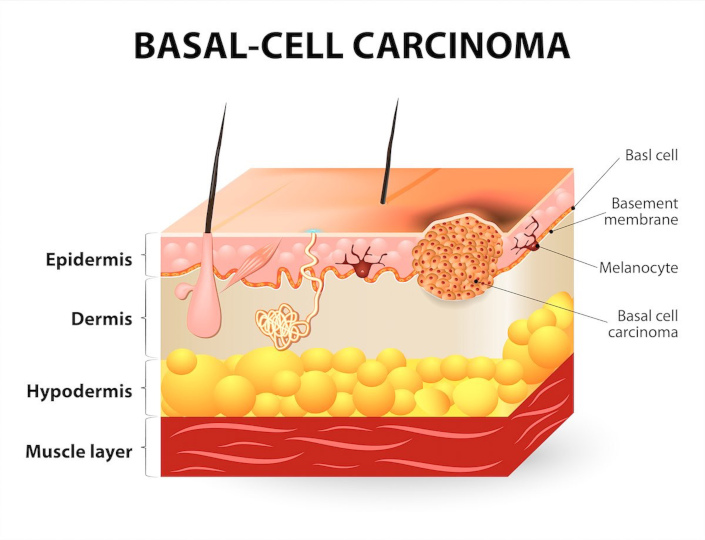Do you have a pimple that just wont heal? A shiny pinkish patch that wont go away?
High Valley Dermatology and Dermatologic Surgery specializes in the diagnosis and treatment of skin cancer. Dr. Sewell and Dr. Miner are fellowship trained Mohs micrographic surgeons, and thus are fellows of the American College of Mohs Surgery (ACMS), founded by Dr. Fred Mohs.
Their full year of fellowship training centered on the precise removal of many different skin cancers, and the aesthetic reconstruction of the surgical defects after their removal. For the most common forms of skin cancer, basal cell carcinoma and squamous cell carcinoma, this technique offers cure rates of 98% and higher.
Basal cell carcinoma is the most common type of skin cancer. It is suspected to be caused by intermittent recreational sun exposure. Basal cell carcinoma is usually located on areas of the face, especially the nose. If left untreated basal cell carcinoma will continue to grow destroying healthy tissue around it. Though possible, basal cell does not readily metastasize. This means that it will rarely travel to other organs, or lymph nodes, and become life threatening. Basal cell carcinoma presents as a nonhealing wound, pink papule, or red scaly patch of skin.

Watch For:
- Open sore similar to a pimple
- Red patch
- Pink hard growth
- "pearly" bump
Prognosis for BCC is excellent when caught early. Treatment typically cures BCCs. Only in rare cases can Basal Cell Cancers spread to other parts of the body and become life-threatening. A biopsy and examination of the lesion under a microscope is necessary for diagnosis. The best treatment option for you is determined by the location, size and depth of the basal cell carcinoma and your overall health
Prevention
Basal cell carcinomas can be prevented by avoiding sun during peak hours 10am- 4pm, wearing sunscreen daily with repeat applications every 2 hours while outdoors, and/ or wearing protective clothing. Preventative skin exams are essential for early detection and diagnosis of basal cell carcinoma.
Risk Factors:
- Fair or freckled skin
- Blonde or red hair
- Family history of skin cancer
- Blue, Green, Grey Eyes
- weakened immune system
- History of tanning bed use
- History of severe sunburns
- Received radiation therapy
- Smoking
Schedule a Skin Cancer Screening
If you have concerns with the health of your skin or need further information on Skin Cancer types, treatment, or prevention, please feel welcome to call High Valley Dermatology.




